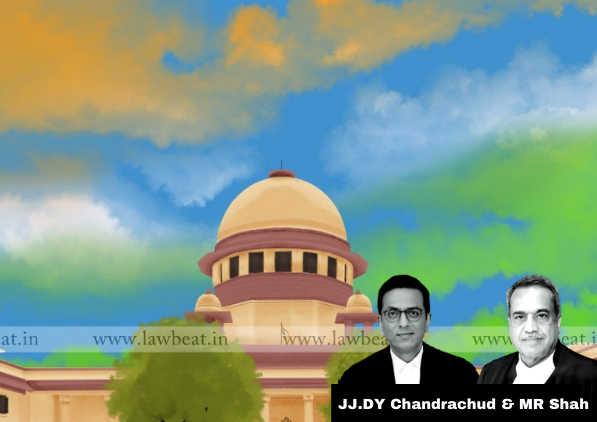Consent Of Parties Cannot Obviate The Duty Of The Court To Indicate Its Reasons For Bail: Supreme Court

Supreme Court in its judgment delivered today set aside the order of bail against six accused, implicated in five homicidal deaths. The Bench reaffirmed that “Court granting bail cannot obviate its duty to apply a judicial mind and to record reasons, brief as they may be, for the purpose of deciding whether or not to grant bail.”
There was a batch of five appeals preferred against the order of the Gujarat High Court, under Section 439 CrPC, 1973.
The matter was argued by Senior Advocate Vinay Navare and Advocate Jaikriti Jadeja for the appellant.
According to the Counsel for the appellant informant, it was the presence of the accused, the pre-meditation on their part, the assault committed on persons belonging to the side of the informant and the resultant five homicidal deaths that should suffice in denying bail to the said accused(s).
A Division Bench of Justice DY Chandrachud and Justice MR Shah, while allowing the present appeals, observed that the High Court has completely ignored the gravity and seriousness of the offences, in addition to a manifest failure in adverting to the material circumstances of the present case.
Observing that the Court misunderstood the central aspect of Parity in Bail matters, the Bench observed, “Parity while granting bail must focus upon role of the accused. Merely observing that another accused who was granted bail was armed with a similar weapon is not sufficient to determine whether a case for the grant of bail on the basis of parity has been established. In deciding the aspect of parity, the role attached to the accused, their position in relation to the incident and to the victims is of utmost importance. The High Court has proceeded on the basis of parity on a simplistic assessment as noted above, which again cannot pass muster under the law.”
Reference was drawn to the case of Neeru Yadav v. State of UP, (2014) 16 SCC 508, where it was held that High Court cannot exercise its powers in ‘capricious manner’ and has to acknowledge the ‘totality of circumstances’ before granting bail.
An FIR was lodged on May 9, 2020 under Sections 302, 143, 144, 147, 148, 149, 341, 384, 120B, 506(2) read with Section 34 of the Indian Penal Code. This was in addition to the provisions of Sections 25(1-b) A, 27 and 29 of the Arms Act and Section 135 of the Gujarat Police Act.
Four days after, a cross FIR was lodged by Vishan (A6), which contained a narration of the pre-existing dispute over land and to another incident that took place on May 7, 2020, resolved with the intervention of the community.
The Court noted four factors which “it was impossible for any judicial mind to gloss over”;
(i) The presence of the accused at the scene of occurrence on May 9, 2020
(ii) The accused being armed with weapons
(iii) The intent to assault
(iv) The actual incident in the course of which Akhabhai and four other persons of his group were waylaid and assaulted, resulting in five homicidal deaths.
Another interesting observation made by the bench was that, Parity in bail matters, cannot be pre judged; “The observation that the grant of bail to A-13 shall not be considered as a precedent for any other person who is accused in the FIR on grounds of parity does not constitute judicially appropriate reasoning. Whether an order granting a bail is a precedent on grounds of parity is a matter for future adjudication if and when an application for bail is moved on the grounds of parity on behalf of another accused.”
With respect to the duty of Court to record reasons in bail matters, the bench noted, “The duty to record reasons is a significant safeguard which ensures that the discretion which is entrusted to the court is exercised in a judicious manner. The recording of reasons in a judicial order ensures that the thought process underlying the order is subject to scrutiny and that it meets objective standards of reason and justice.”
Reliance was placed in this regard on Chaman Lal v. State of UP, (2004) 7 SCC 525.
Also, while disapproving the manner in which the bail application of one of the accused was disposed of, the bench under Para 37 enumerated four precise factors that should have been considered by the High Court; (1) The facts of the case (2) Nature of Allegations (3) Gravity of Offence (4) Role attributed to the accused.
Cases inter-alia relied by the Bench; Ash Mohammad v. Shiv Raj Singh, (2012) 9 SCC 446, Sonu v. Sonu Yadav, Criminal Appeal No. 377 of 2021, Sanjay Chandra v. CBI, 2012 (1) SCC 40, Mahipal v. Rajesh Kumar, (2020) 2 SCC 118, State of Kerala v. Mahesh, Criminal Appeal No. 343 of 2021.
Case Title: Ramesh Bhavan Rathod v. Vishanbhai Hirabhai Makwana | CRIMINAL APPEAL NO. 422 of 2021
Authored By: Justice DY Chandrachud
